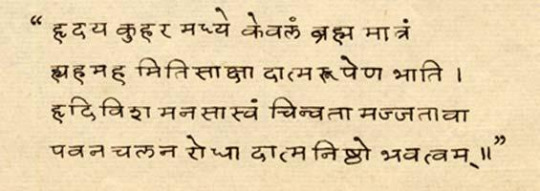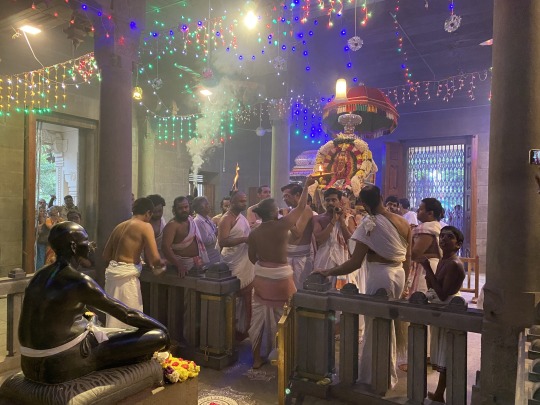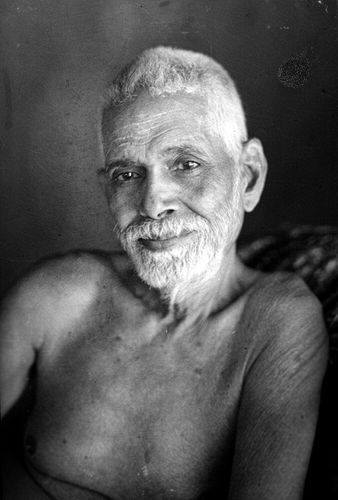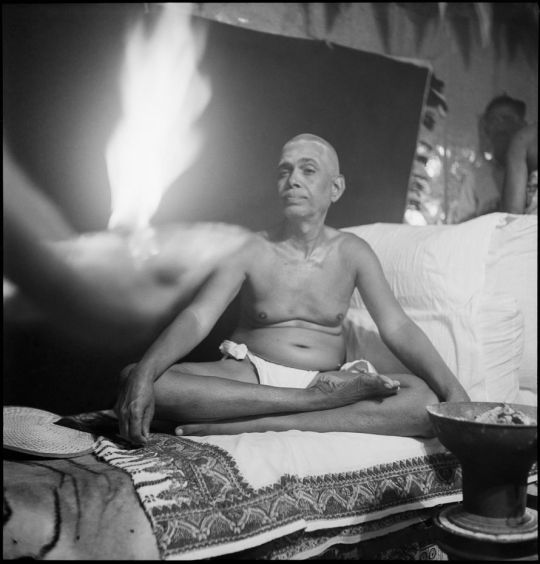Video
youtube
Hridaya Kuhara Madhye 'Sloka Chanting'
🕉️
हृदयकुहर मध्ये केवलं ब्रह्ममात्रम्।
ह्यमहमिति साक्षद् आत्मरुपेण भाति॥
हृदि विश मनसास्वं चिन्वता मज्जता वा।
पवन चलन रोधाद् आत्मनिष्ठो भव त्वम्॥
hṛdayakuhara madhye kevalaṃ brahmamātram।
hyamahamiti sākṣad ātmarupeṇa bhāti॥
hṛdi viśa manasāsvaṃ cinvatā majjatā vā।
pavana calana rodhād ātmaniṣṭho bhava tvam॥
🕉️
‘Hridaya-Kuhara-Madhye’, In the centre of the Heart cave
In the centre of the cave which is the Heart, the one (non-dual) Brahman alone shines directly in the form of Self as ‘I-I’ (or ‘I am I’ ). Enter the Heart (by the mind) sinking scrutinizing Self, or by the mind sinking along with the breath, and be one who abides in Self.
~ Ulladu Narpadu - Anubandham (Reality in Forty Verses - Supplement), V. 8
Note: One day in 1915 a devotee named Jagadiswara Sastri started to compose a Sanskrit verse beginning with the words. ‘Hridaya-Kuhara-Madhye’, (In the centre of the Heart cave), but finding that he was unable to proceed any further to express in verse form the idea which he had in mind, he implored Sri Bhagavan to complete the verse for him. Sri Bhagavan accordingly completed the verse and wrote underneath ‘Jagadisan’, thereby indicating that the ideas in the verse were those of Jagadiswara Sastri and not His own. Some years later, at the request of some Tamil devotees who did not know Sanskrit, Sri Bhagavan translated this verse into Tamil, and the Tamil version, which is given above, was later added in the Anubandham.
_____________
Kavyakanta Ganapati Muni also included this verse in his Sri Ramana Gita, ch. II, v. 2.
🕉️

___________________
The Sanskrit verse is a facsimile of Sri Ramana Maharshi’s handwriting reproduced from the manuscript.
___________________
Eka Sloki of Sri Ramana Maharshi, his most important verse, was mounted during Bhagavan´s lifetime, obviously with his consent, above his ornate marble couch in the New Hall, where the verse is engraved in gold Sanskrit letters on a tablet of polished black marble.

Image credit: https://www.facebook.com/RamanaMaharshi - Post dated 12.06.2020
🕉️
#youtube#Bhagavan Sri Ramana Maharshi#Sri Ramana Gita#B. V. Narasimha Swami#Kavyakantha Ganapati Sastri#Jagadiswara Sastri#Heart#Heart - cavern#hridaya kuhara madhye#self-investigation#self-inquiry#vichara#atma-vichara#Who Am I?#plunge the pure mind into the Heart
4 notes
·
View notes
Text
Arunachala Mountain ✨🔱🕉🔥✨
A Full Trek - From Base to Peak - By Grace of Sri Ramana
youtube
Ram MoanK said:
This is a video of my second trek in the last four years-from the base of Arunachala Hill (from behind Ramanasramam) to the peak of the Hill.
On the first day I had to come down after climbing upto Skandasramam because of some issues.
The next morning I went up again. This time after climbing more than half way, my camera started having some problem!
However being determined to complete the trek and the video, I did some deft work, the result of which is before you. Hope viewers can also enjoy some of my favorite BG Music which I have incorporated in the video.
Audios:
Arunagiri Yogi by JJ and L.Rao
Hari Hara Abheda Dasa Sloki-by JJ
Song on Ramana Naamam by unknown
Instrumental Veena by Rajesh Vaidya
Siva Taandava Stotram by Unknown.
✨🔱🕉🔥✨
8 notes
·
View notes
Text

ॐ
How many are there who have been ruined like me for thinking this Hill to be the Supreme? O men, disgusted with this life of intense misery, ye seek a means of giving up the body; there is on earth a rare drug which, without actually killing him, will annihilate anyone who so much as thinks of it. Know that it is none other than this Arunachala.
— Bhagavan Sri Ramana Maharshi - “Sri Arunachala Padikam” - "Eleven Verses To Sri Arunachala", Verse 11
ॐ
~ Image: ARUNACHALA
My first watercolor, inspired by a photograph of Bernd Kalidas Flory
ॐ
#bhagavan sri ramana maharshi#arunachala#Arunachala Padikam#AP v.11#devotion#bhakti#non-duality#self-surrender#divine grace
9 notes
·
View notes
Text

ॐ
Quantos há que foram destruídos como eu por terem pensado que este Monte é o Supremo? Ó homens, desgostosos desta vida de intenso sofrimento, que buscais um meio de renunciar ao corpo; existe na terra uma droga rara que, sem realmente o matar, aniquilará qualquer um que pense nela. Saiba que não é senão este Arunachala.
— Bhagavan Sri Ramana Maharshi - “Sri Arunachala Padikam” - "Onze Versos Para Sri Arunachala", Verso 11
ॐ
~ Imagem: ARUNACHALA
A minha primeira aguarela, inspirada numa fotografia de Bernd Kalidas Flory
ॐ
#bhagavan sri ramana maharshi#arunachala#Arunachala Padikam#AP v.11#devoção#bhakti#rendição#entrega#não-dualidade#graça divina
6 notes
·
View notes
Text
IN FOCUS - This Month at Sri Ramana Maharshi Ashram - SRI RAMANASRAMAM
youtube
7 notes
·
View notes
Video
youtube
2023-10-28 Ramana Maharshi Foundation UK: Understanding solipsism as taught by Bhagavan Ramana
------------------------
eka-jīva-vāda Means the contention that there is just one jiva, one ego. This is very fundamental in Bhagavan’s teachings; it is implied in so many of Bhagavan’s teachings. For example, this one example out of many, it is implied throughout Uḷḷadu Nārpadu (Reality in Forty Verses), but one place where it is particularly clear is in Verse 26:
If ego comes into existence, everything comes into existence; if ego doesn’t exist, everything doesn’t exist. Ego itself is everything. Therefore, investigating what it is, is giving up everything.
This verse would make no sense if there were multiple egos, because the multiplicity of egos should be part of the «everything» that Bhagavan refers to when he says «If ego comes into existence, everything comes into existence». So, we can make sense of this verse, and so many other teachings of Bhagavan, only if we are willing to accept that a fundamental principle of Bhagavan’s teachings is that there is just one ego. This teaching that there is just one ego is what in western philosophy is referred to a solipsism. However, the solipsism taught by Bhagavan is a very much deeper and more nuanced solipsism. [...]
------------------------
In a Zoom meeting with the Ramana Maharshi Foundation UK on 28th October 2023, Michael James talks about solipsism as taught by Bhagavan, and answers various questions about Bhagavan’s teachings. The analytical set of premises and inferences that he offers for consideration at the beginning this meeting is:
1. We are the experiencer of all that we experience.
2. As the experiencer, we always experience ourself as a person.
3. As the experiencer, we perceive a world that is full of other people, who are just like the person we seem to be.
4. Since we, the experiencer, always experience ourself as a person, every other person seems to us to be an experiencer, just like us.
5. All the other people and their experiences are no less real than the person we seem to be.
6. So long as we seem to be a person, we experience suffering, and every other person seems to us to experience suffering in the same way.
7. So long as we are firmly convinced that this person whom we seem to be is what we actually are, then our suffering and the suffering of all other people will inevitably seem to us to be real.
8. But are we this person? In other words, is this person what we actually are?
9. If this person is not what we actually are, our experience of ourself as ‘I am this person’ is an illusion, and hence unreal.
10. Everything that we (as the experiencer) experience is based upon our experience of ourself as a person, because we experience things other than ourself only when we experience ourself as a person (namely in waking and in dream).
11. Therefore if our experience of ourself as ‘I am this person’ is an illusion, our experience of everything else must be equally illusory.
12. If our experience of everything else is illusory, the person we seem to be and all the other people are a part of that illusion, and hence unreal.
13. If the person we seem to be and all the other people are unreal, their suffering and everything else that they seem to experience must also be unreal.
14. Therefore, since the appearance of multiple experiencers exists in the view of ourself as an experiencer who experiences itself as a person, if we are not this person, then the entire appearance of multiple experiencers is an illusion, and hence unreal.
15. Since there can be no appearance without an experiencer of it, the root cause of the entire appearance of multiple experiencers is the experiencer of it, namely ourself.
16. Therefore, before we can reliably judge the reality of the appearance of multiple experiencers, we first need to investigate and find out the reality of ourself, in whose view all those multiple experiencers seem to exist.
------------------------
4 notes
·
View notes
Text

Sri Ramana Maharshi - Sri Ramanasramam
🕉️
Bhagavan is an expert doctor who has precisely diagnosed the root cause of all our problems, namely ego, and he has prescribed the perfect medicine to eradicate this root cause, namely the simple practice of patient and persistent self-investigation and self-surrender.
Therefore, if we want to be benefited by his teachings, our primary duty to ourself is to try our best to subside deep within by patiently persevering in our practice of self-investigation and self-surrender.
When we do so, we will face many obstacles in the form of our viṣaya-vāsanās (inclinations to seek happiness in objects or phenomena), but we should never give up, because as Bhagavan often said, ‘Nobody has ever succeeded on this path without perseverance’. No matter how many obstacles we may face, and how many times we may seem to fail, if we patiently persevere in trying our best to cling firmly to self-attentiveness, by his grace we will surely succeed eventually in sinking back into the innermost depth of our heart, where he shines eternally as the infinitely clear light of pure awareness, waiting like an old lion to devour us as soon as we enter his abode.
~ Michael James, in
✨Ramana Maharshi’s Forty Verses on What Is✨
✨- The ultimate truth on being as you actually are -✨
A compilation of the writings and talks on 𝖴ḷḷ𝖺𝖽𝗎 𝖭āṟ𝗉𝖺𝖽𝗎 by Michael James.
Compiled and edited by Sandra Derksen
✨🔱✨
#Bhagavan Sri Ramana Maharshi#Ulladu Narpadu#Reality in Forty Verses#forty verses on what is#Michael James#Sandra Derksen#self-investigation and self-surrender
11 notes
·
View notes
Text

Sri Ramana Maharshi - Sri Ramanasramam
🕉️
Bhagavan é um médico especialista que diagnosticou com precisão a causa raiz de todos os nossos problemas, ou seja, o ego, e prescreveu o remédio perfeito para erradicar essa causa raiz, ou seja, a simples prática da auto-investigação e da auto-entrega paciente e persistente.
Portanto, se quisermos ser beneficiados pelos seus ensinamentos, o nosso principal dever para com nós mesmos é tentar o nosso melhor para mergulharmos profundamente no nosso interior, perseverando pacientemente na nossa prática de auto-investigação e auto-entrega.
Ao fazermos isso, enfrentaremos muitos obstáculos na forma das nossas viṣaya-vāsanās (inclinações para buscar a felicidade em objetos ou fenómenos), mas nunca devemos desistir, porque, como Bhagavan costumava dizer: 'Nunca ninguém teve sucesso neste caminho sem perseverança'. Não importa quantos obstáculos possamos enfrentar, e quantas vezes pareçamos falhar, se perseverarmos pacientemente em tentar o nosso melhor para nos apegarmos firmemente à auto-atenção, pela sua graça certamente conseguiremos finalmente afundarmo-nos de volta nas profundezas mais íntimas do nosso coração, onde ele brilha eternamente como a luz infinitamente clara da pura consciência, esperando como um velho leão para nos devorar assim que entrarmos na sua morada.
~ Michael James, in
✨Ramana Maharshi’s Forty Verses on What Is✨
✨- The ultimate truth on being as you actually are -✨
A compilation of the writings and talks on 𝖴ḷḷ𝖺𝖽𝗎 𝖭āṟ𝗉𝖺𝖽𝗎 by Michael James.
Compiled and edited by Sandra Derksen
✨🔱✨
#Bhagavan Sri Ramana Maharshi#Ulladu Narpadu#Reality in Forty Verses#forty verses on what is#Michael James#Sandra Derksen#self-investigation and self-surrender
2 notes
·
View notes
Text

Om Namo Bhagavate Sri Arunachalaramanaya
🕉️
True love is giving, not taking. If we truly love someone, we will not be concerned about what we can take or gain from them for ourself but only about what we can give to them. So long as we seek to gain anything from God for ourself, our love for him is still impure. If our love for him is pure, we will want nothing but to give ourself entirely to him. Therefore pure bhakti is heart-melting and all-consuming love to give ourself completely and unreservedly to God. Few of us have such bhakti in its fullest form, but if we are following the spiritual path this is what we should be aspiring for and working towards. Complete surrender of ourself to God, the one infinite and eternal reality that always exists and shines in our heart as our own being, ‘I am’, alone is the true and ultimate goal of bhakti.
When we start on the path of bhakti, God seems to be something other than ourself, so we try to express our love for him through actions of body, speech and mind, namely pūjā (worship of him), stōtra (singing his praises) or japa (repetition of his name) and dhyāna (meditation on him) respectively, and by the love with which we do such actions our mind is gradually purified, meaning that it is cleansed of all its inclinations to seek happiness in anything other than love for God, as Bhagavan explains in verses 3, 4-5-6-7 of Upadēśa Undiyār. As our mind is thereby purified, we gain the clarity to recognise that we cannot actually be anything other than God, the one infinite whole, the fullness of being, the only thing that actually exists, so since we have thereby come to understand that he alone is what we actually are, we cease seeking him outside ourself and instead begin to seek him only in the depth of our own heart. That is, instead of meditating on him as something other than ourself, as we were doing previously, we start to meditate on him as none other than ourself, with the clear understanding that he is I.
Since the nature of ourself as ego is to rise, stand and flourish by attending to things other than ourself, we will subside and sink back into the depth of our heart only to the extent to which we attend to ourself alone, as Bhagavan makes clear in verse 25 of Uḷḷadu Nāṟpadu, so by meditating on ourself we are surrendering ourself to God, and hence in verse 8 of Upadēśa Undiyār he says that ananyabhāva, meditating on nothing other than ourself, is ‘அதனத்தினும் உத்தமம்’ (aṉaittiṉum uttamam), ‘best among all’, implying that it is not only the best practice of bhakti and most effective means to purify the mind but also the only means by which we can eradicate ego and thereby surrender ourself completely to God. Since we as ego will subside back into our being to the extent to which we attend to ourself, when by persistent practice our self-attentiveness becomes strong and stable enough, we will thereby be firmly fixed in our true state of being (sat-bhāva), which transcends all mental activity, so being in this state is para-bhakti tattva, the true state of supreme devotion, as Bhagavan says in verse 9 of Upadēśa Undiyār, because it is the state in which we have given ourself wholly to God and therefore do not rise as ego to know anything other than ourself.
The path of bhakti is therefore a gradual progression towards this state of complete self-surrender, as also is the path of jñāna, so the goal of both these paths is identical, even though the followers of each may describe it in different terms. What is called complete self surrender in the path of bhakti is what is called eradication of ego and consequent removal of avidyā in the path of jñāna. If we go deep in following either of these paths, the superficial differences that others see between them will dissolve and disappear, and we will clearly recognise that they are one and inseparable, not only in their ultimate goal but also at deeper levels in their practice.
~ Michael James, in
✨Ramana Maharshi’s Forty Verses on What Is✨
✨- The ultimate truth on being as you actually are -✨
A compilation of the writings and talks on 𝖴ḷḷ𝖺𝖽𝗎 𝖭āṟ𝗉𝖺𝖽𝗎 by Michael James. Compiled and edited by Sandra Derksen
✨🔱✨
#Bhagavan Sri Ramana Maharshi#Ulladu Narpadu#Reality in Forty Verses#forty verses on what is#Upadesa Undiyar#Michael James#Sandra Derksen#bhakti devotion#path of self-surrender#path of jnana
5 notes
·
View notes
Text

Om Namo Bhagavate Sri Arunachalaramanaya
🕉️
O verdadeiro amor é dar, não receber. Se realmente amamos alguém, não nos preocuparemos com o que podemos tirar ou ganhar dessa pessoa para nós mesmos, mas apenas com o que podemos dar-lhe. Enquanto procurarmos ganhar alguma coisa de Deus para nós mesmos, o nosso amor por ele ainda será impuro. Se o nosso amor por ele for puro, não desejaremos nada além de nos entregarmos inteiramente a ele. Portanto, pura bhakti, devoção, é um amor que derrete o coração e que tudo consome, por nos entregarmos completamente e sem reservas a Deus. Poucos de nós temos tal bhakti em sua forma mais completa, mas se estamos a seguir o caminho espiritual é por isso que devemos aspirar e trabalhar. A entrega completa de nós mesmos a Deus, a única realidade infinita e eterna que sempre existe e brilha em nosso coração como nosso próprio ser, ‘eu sou’, é o único e verdadeiro objetivo de bhakti.
Quando iniciamos o caminho de bhakti, Deus parece ser algo diferente de nós mesmos, então tentamos expressar o nosso amor por ele através de ações de corpo, fala e mente, nomeadamente pūjā (ritual de adoração), stōtra (cantar seus louvores) ou japa (repetição do seu nome) e dhyāna (meditação sobre ele), respectivamente, e pelo amor com que realizamos tais ações, a nossa mente é gradualmente purificada, o que significa que ela é purificada de todas as suas inclinações para buscar a felicidade em qualquer coisa que não seja o amor por Deus, como Bhagavan explica nos versículos 3, 4-5-6-7 de Upadēśa Undiyār. À medida que a nossa mente é assim purificada, ganhamos clareza para reconhecer que não podemos realmente ser outra coisa senão Deus, o único todo infinito, a plenitude do ser, a única coisa que realmente existe, então, uma vez que passamos a compreender que ele é o que realmente somos, deixamos de buscá-lo fora de nós mesmos e começamos a buscá-lo apenas no fundo do nosso coração. Ou seja, em vez de meditar nele como algo diferente de nós mesmos, como fazíamos anteriormente, passamos a meditar nele como alguém não diferente de nós mesmos, com a clara compreensão de que ele é eu.
Visto que a natureza de nós mesmos como ego é surgir, permanecer e florescer através da atenção a outras coisas além de nós mesmos, nós decresceremos e nos afundaremos de volta nas profundezas do nosso coração apenas na medida em que prestarmos atenção apenas a nós mesmos, como Bhagavan deixa claro no versículo 25 de Uḷḷadu Nāṟpadu, então, ao meditar no nosso ser, estamos a render-nos a Deus e, assim, no versículo 8 de Upadēśa Undiyār ele diz que ananyabhāva, meditar em nada além de nós mesmos, é ‘அதனத்தினும் உத்தமம்’ (aṉaittiṉum uttamam), ‘a melhor entre todas’, o que implica que não só é a melhor prática de bhakti e o meio mais eficaz para purificar a mente, mas também o único meio pelo qual podemos erradicar o ego e, assim, rendermo-nos completamente a Deus. Visto que nós, como ego, retornaremos e nos afundaremos no nosso ser na medida em que prestarmos atenção a nós mesmos, quando pela prática persistente a nossa auto-atenção se tornar forte e estável o suficiente, estaremos assim firmemente fixados no nosso verdadeiro estado de ser (sat-bhāva), que transcende toda a atividade mental, portanto, estar neste estado é para-bhakti tattva, o verdadeiro estado de devoção suprema, como diz Bhagavan no verso 9 de Upadēśa Undiyār, porque é o estado em que nos entregamos totalmente a Deus e, portanto, não nos elevamos como ego para conhecer outra coisa diferente de nós mesmos.
O caminho de bhakti é, portanto, uma progressão gradual em direção a este estado de completa auto-entrega, assim como é o caminho de jñāna, de modo que o objetivo de ambos os caminhos é idêntico, embora os seguidores de cada um possam descrevê-lo em termos diferentes. O que é chamado de auto-rendição completa no caminho de bhakti é o que é chamado de erradicação do ego e consequente remoção de avidyā no caminho de jñāna. Se nos aprofundarmos em seguir qualquer um destes caminhos, as diferenças superficiais que os outros vêem entre eles se dissolverão e desaparecerão, e reconheceremos claramente que eles são um e inseparáveis, não apenas em seu objetivo final, mas também em níveis mais profundos da sua prática.
~ Michael James, in
✨Ramana Maharshi’s Forty Verses on What Is✨
✨- The ultimate truth on being as you actually are -✨
A compilation of the writings and talks on 𝖴ḷḷ𝖺𝖽𝗎 𝖭āṟ𝗉𝖺𝖽𝗎 by Michael James. Compiled and edited by Sandra Derksen
✨🔱✨
#Bhagavan Sri Ramana Maharshi#Ulladu Narpadu#Reality in Forty Verses#forty verses on what is#Upadesa Undiyar#Michael James#Sandra Derksen#bhakti devoção#auto-redição#auto-entrega#conhecimento
0 notes
Text
Bhagavan Sri Ramana

In order to have true and deep love for him, we need to trust him, and our trust in him and consequent love for him are born out of clarity of mind and heart, which naturally arises from within to the extent that our mind is purified, meaning cleansed of its impurities, namely its likes, dislikes, desires, attachments, hopes, fears and so on. All this happens by his grace, but his grace needs to work through us in order to bring about these changes, and it can work through us only to the extent that we are willing to yield ourself to it, thereby allowing it to cleanse us of our impurities and thereby give us the clarity to trust him and love him wholeheartedly.
~ Michael James, in
✨Ramana Maharshi’s Forty Verses on What Is✨
✨- The ultimate truth on being as you actually are -✨
A compilation of the writings and talks on 𝖴ḷḷ𝖺𝖽𝗎 𝖭āṟ𝗉𝖺𝖽𝗎 by Michael James. Compiled and edited by Sandra Derksen
✨🔱✨
#Bhagavan Sri Ramana Maharshi#Ulladu Narpadu#Reality in Forty Verses#forty verses on what is#Michael James#Sandra Derksen
6 notes
·
View notes
Text
Bhagavan Sri Ramana

Para ter um amor verdadeiro e profundo por ele, precisamos confiar nele, e a nossa confiança nele e o consequente amor por ele nascem da clareza de mente e coração, que surge naturalmente de dentro, na medida em que a nossa mente é purificada, isto é, limpa das suas impurezas, ou seja, dos seus gostos, aversões, desejos, apegos, esperanças, medos e assim por diante. Tudo isto acontece pela sua graça, mas a sua graça precisa trabalhar através de nós para desencadear estas mudanças, e só pode operar através de nós na medida em que estivermos dispostos a rendermo-nos a ela, permitindo assim que ela nos purifique das nossas impurezas e assim nos dê a clareza para confiar nele e amá-lo de todo o coração.
~ Michael James, in
✨Ramana Maharshi’s Forty Verses on What Is✨
✨- The ultimate truth on being as you actually are -✨
A compilation of the writings and talks on 𝖴ḷḷ𝖺𝖽𝗎 𝖭āṟ𝗉𝖺𝖽𝗎 by Michael James.
Compiled and edited by Sandra Derksen
✨🔱✨
#Bhagavan Sri Ramana Maharshi#Ulladu Narpadu#Reality in Forty Verses#forty verses on what is#Michael James#Sandra Derksen
1 note
·
View note
Text
Bhagavan Sri Ramana Maharshi (1879 - 1950) taught us that infinite and eternal happiness is our own real nature, and that the reason we are not aware of ourself as such is that we now mistake ourself to be a finite person consisting of body, life, mind, intellect and will, which is not what we actually are. Therefore in order to know and to be the perfect happiness that we always actually are, it is necessary for us to be aware of ourself as we actually are, and the means for this is for us to investigate ourself and thereby surrender the false ‘self’ (namely ego) that we now seem to be.
~ Michael James, in
✨Ramana Maharshi’s Forty Verses on What Is✨
✨- The ultimate truth on being as you actually are -✨
A compilation of the writings and talks on 𝖴ḷḷ𝖺𝖽𝗎 𝖭āṟ𝗉𝖺𝖽𝗎 by Michael James.
Compiled and edited by Sandra Derksen
✨🔱✨
#Bhagavan Sri Ramana Maharshi#Ulladu Narpadu#Reality in Forty Verses#forty verses on what is#Michael James#Sandra Derksen
6 notes
·
View notes
Text
Bhagavan Sri Ramana Maharshi (1879 - 1950) ensinou-nos que a felicidade infinita e eterna é a nossa verdadeira natureza, e que a razão pela qual não temos consciência de nós mesmos como tal é que agora nos confundimos com uma pessoa finita que consiste em corpo, vida, mente, intelecto e vontade, que não é o que realmente somos. Portanto, para conhecer e ser a felicidade perfeita que sempre somos, é necessário que estejamos conscientes de nós mesmos como realmente somos, e o meio para isso é investigarmos a nós mesmos e, assim, renunciarmos ao falso 'eu' (nomeadamente o ego) que agora parecemos ser.
~ Michael James, in
✨Ramana Maharshi’s Forty Verses on What Is✨
✨- The ultimate truth on being as you actually are -✨
A compilation of the writings and talks on 𝖴ḷḷ𝖺𝖽𝗎 𝖭āṟ𝗉𝖺𝖽𝗎 by Michael James.
Compiled and edited by Sandra Derksen
✨🔱✨
2 notes
·
View notes
Text
"Because we see the world, accepting one fundamental that has a power that becomes many is certainly the one best option. The picture of names and forms, the one who sees, the cohesive screen, and the pervading light – all these are he, who is oneself. "
Bhagavan Sri Ramana Maharshi - Ulladu Narpadu, V. 1
✨🔱✨"[...] all the phenomena that we perceive, that seem to exist, exist only in our view. Regardless of anyone’s philosophy, religion, science or whatever outlook, nobody can deny that it is our experience that the world, all phenomena, only exist in our own view. Who sees all those many things? I do. In whose view does this world exist? In my view. We all have to accept that in the experience of each one of us there is one seer (experiencer or perceiver, also the subject) and many things seen (experienced or perceived, also the objects). This is why we have to collapse the multiplicity back to one perceiver, because all phenomena, including all the other seeming perceivers, exist only in the view of one perceiver, one ego. So we all know at least there is one — that is, ‘I’ — who perceives this world, in whose view multiplicity exists.
~ Michael James, in
✨Ramana Maharshi's Forty Verses on What Is✨
✨- The ultimate truth on being as you actually are -✨
A compilation of the writings and talks on 𝖴ḷḷ𝖺𝖽𝗎 𝖭āṟ𝗉𝖺𝖽𝗎 by Michael James.
Compiled and edited by Sandra Derksen ✨🔱✨

#Bhagavan Sri Ramana Maharshi#Ulladu Narpadu#UN v.1#Reality in Forty Verses#forty verses on what is#advaita#non-duality#Reality Brahman substratum fundamental
9 notes
·
View notes
Text
Porque nós vemos o mundo, aceitar um fundamental que tem um poder que se torna muitos é certamente a melhor opção. O filme com nomes e formas, aquele que vê, a tela coesiva e a luz que tudo impregna - tudo isso é ele, que é o nosso próprio ser.
Bhagavan Sri Ramana Maharshi - Ulladu Narpadu, V. 1
✨🔱✨"[...] todos os fenómenos que percebemos, que parecem existir, existem apenas na nossa visão. Independentemente da filosofia, religião, ciência ou qualquer perspectiva de qualquer pessoa, ninguém pode negar que é nossa experiência que o mundo, todos os fenómenos, só existem na nossa própria visão. Quem vê todas essas coisas? Sou eu. Na visão de quem este mundo existe? Na minha visão. Todos nós temos que aceitar que na experiência de cada um de nós existe um observador (experimentador, percebedor ou percepcionador, também o sujeito) e muitas coisas vistas (experimentadas, percebidas ou percepcionadas, também os objetos). É por isso que temos de reduzir a multiplicidade de volta a um observador, porque todos os fenómenos, incluindo todos os outros percepcionadores aparentes, existem apenas na visão de um observador, um ego. Portanto, todos sabemos que pelo menos existe um - isto é, "eu" - que percebe este mundo, em cuja visão existe multiplicidade."
~ Michael James, in
✨Ramana Maharshi's Forty Verses on What Is✨
✨- The ultimate truth on being as you actually are -✨
A compilation of the writings and talks on 𝖴ḷḷ𝖺𝖽𝗎 𝖭āṟ𝗉𝖺𝖽𝗎 by Michael James.
Compiled and edited by Sandra Derksen
✨🔱✨

#Bhagavan Sri Ramana Maharshi#Ulladu Narpadu#UN v.1#Reality in Forty Verses#forty verses on what is#advaita#não-dualidade#Realidade Brahman substrato fundamental
1 note
·
View note
